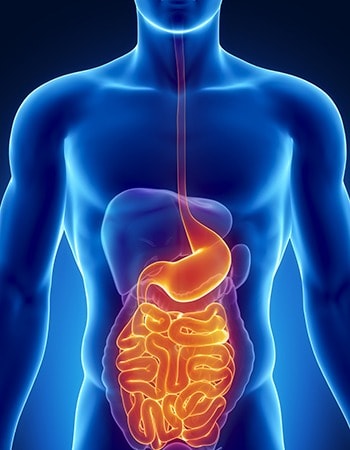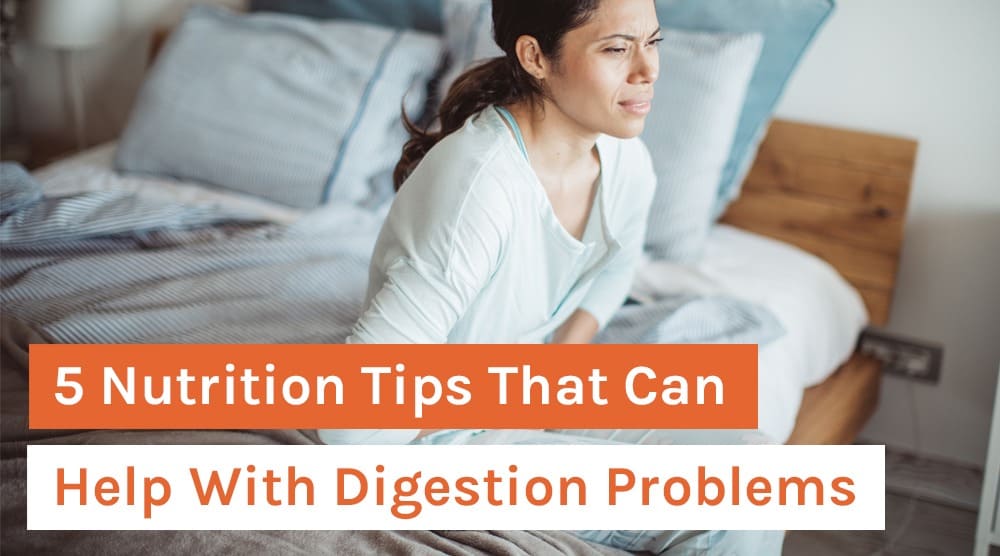5 Nutrition Tips That Can Help With Digestion Problems
In a hurry? Click here to read the Article Summary...
Everyone needs it in order to live. But what happens when food becomes a detriment to your body rather than a source of nourishment? Nobody wants to feel gassy, bloated, or in pain after eating a meal, and yet these are the types of digestion problems that millions of people suffer as part of their mealtime ritual.
Food items that should be producing energy and providing physical sustenance, in other words, are actually hurting them. But the question is… why?
For some, allergies are to blame for digestive issues. For others, it’s the growing number of chemical toxins in the food supply. For still others (perhaps most people) it’s a generalized gut imbalance.
This imbalance can stem from not having enough digestive juices − including vital enzymes − to effectively break down food so the body can effectively use it.
Millions of Americans Are Suffering From Digestive Issues
The National Institutes of Health (NIH) estimates that as many as 70 million people in the U.S. suffer from some type of digestion problems. Nearly 50 million ambulance calls are made every year for folks who suffer severe digestive episodes, while more than 21 million hospitalizations take place for the same reason.
Quite soberingly, nearly a quarter of a million people living in the U.S. die every year because of digestive disease.
These are worst-case scenario digestive problems, mind you. Millions more people suffer from everyday stomach aches, indigestion, acid reflux, and gastrointestinal upset after they eat − and perhaps you’re one of them.
Such symptoms might be common in today’s society, but they’re certainly not normal. So what can you do to overcome them and actually enjoy eating a meal rather than dread it?
5 Ways to Alleviate Digestive Problems
Here are 5 tips that can help prevent and/or alleviate many common digestion problems:
#1: Take Probiotics

Your digestive tract isn’t just a set of mechanical tubes through which food enters and travels through the body. It’s a vibrant ecosystem made up of beneficial bacteria known as probiotics that functions as a living organism to support the body.
It does this by taking the foods you eat and breaking them down into smaller molecules, which are passed through the wall of the digestive tract into the bloodstream for use throughout the body.
This diverse probiotic environment within the gut also functions as a powerful immune defense against pathogenic invaders and toxins. The billions upon billions of beneficial bacterial strains that live within the gut serve as a well-trained army to let the good in while keeping out the bad.
These bacterial strains also function as the bulk of the body’s natural immune system. In fact it can be up to 80% of the immune system, which is why it’s critical to keep them in check.
Besides eating probiotic foods like yogurt and kefir, taking a probiotic supplement can help keep the body’s “second brain” fruitful and multiplying. Maintaining a healthy probiotic environment will help ensure that the gut is adequately and optimally processing the foods you eat, while also helping to protect you against digestive disease.
Discover 5 tips for healthy digestion, and learn the three most significant reasons why people suffer from digestive problems.
#2: Drink Plenty of Water
Another important part of maintaining optimal gut health is to drink plenty of clean (filtered) water − at least a gallon per day, especially if you work out or lift weights.
Hydration is essential for keeping the intestinal tract smooth, flexible, and clean. Without water, food can become hardened and impacted, leading to constipation and buildup. It then starts to rot from the inside, creating a toxic environment that both damages gut bacteria and progressively destroys the other digestive co-factors that process nutrients from food while discarding of waste.
In his book Microcosm: E. Coli and the New Science of Life, author Carl Zimmer explains how hydration is essential for maintaining healthy gut flora. Dehydration can also cause immune cells in the gut to go awry.
This can lead to a situation where the immune system is no longer able to differentiate between the good and the bad that enters it − not a good thing for your health. When hydrating, be sure to drink purified or spring water that is free of fluoride, chlorine, and other pollutants commonly found in municipal water supplies.
#3: Learn How to Manage Stress
 Believe it or not, stress is also a major contributor to gastrointestinal upset. Since the gut and brain are intimately connected on a neurological level, what you think about − and more importantly, what you worry about − often gets transferred to areas inside your midsection.
Believe it or not, stress is also a major contributor to gastrointestinal upset. Since the gut and brain are intimately connected on a neurological level, what you think about − and more importantly, what you worry about − often gets transferred to areas inside your midsection.
Your gut then responds by releasing various secretions to offset it, including those involved in the “fight or flight” response that over time can take a huge toll on the health of your body.
Then, there’s the “which came first, the chicken or the egg?” scenario. Stress is known to cause damage to the gut in the same way that a damaged gut is known to produce more stress. In many cases simply due to the way that compromised digestion harms brain chemistry.
The solution here is to learn how to better mitigate daily stressors, which may include adjusting your work-life balance and making more time for family and friends.
If you don’t effectively take care of the stress in your life, your body will progressively lose its ability to absorb nutrients, oxygenate the gut and blood, ward off disease, manufacture enzymes, and perform vital repairs and maintenance. In other words, your body and its systems will deteriorate as a result of having to try to overcome the abuse it’s being exposed to.
#4: Supplement with Digestive Enzymes
Similar to probiotics, the digestive enzymes that your body naturally produces are designed to break down the foods you eat into substances that your body can use for maintenance and repair. Your body also relies upon food enzymes that exist naturally in raw and fermented foods.
Unfortunately, these are foods that many people do not consume nearly enough of to maintain a healthy digestive flow, often leading to digestion problems.
Full-spectrum digestive and proteolytic enzyme supplements can help bridge the gap here and give your body that extra boost it needs to take full advantage of the nutrition you put into it. This still requires eating healthy and following the other advice outlined in this article, but it’s also an important piece of the digestive puzzle that you simply can’t overlook when trying to correct or avoid digestive disease.
#5: Eat More “Living” Foods
 Where many of these recommendations converge is diet, which when it’s properly aligned can tie in probiotics, enzymes, and hydration into one single package.
Where many of these recommendations converge is diet, which when it’s properly aligned can tie in probiotics, enzymes, and hydration into one single package.
“Living” foods are foods that haven’t been processed, cooked, or pasteurized.
In many ways these types of foods represent an all-in-one solution for digestive problems and disease.
Raw foods grown without chemicals or irradiation in healthy soil are the healthiest kinds of foods you can feed your body. Raw foods that have been fermented, cultured, and/or sprouted using traditional preservation methods can be even better.
This is because they contain enhanced levels of probiotic bacteria and enzymes, both of which unlock the full nutritive potential of food and make it optimally bioavailable for the body. Just remember to chew your food thoroughly to make it suitable for reception into your digestive tract.
Some examples of living foods that can help with digestion include:
- Chia, hemp, and flaxseeds
- Organic fruits and vegetables
- Probiotic foods like kombucha, kimchi, and kefir
- Raw milk, and especially that of a goat, sheep, or camel
- Fresh juices from things like wheatgrass, celery, and green apples
- Therapeutic herbs like dandelion leaf and cilantro, both of which stimulate enzyme production
Enzyme 17 and ProBiotixx+ from Organixx: When you combine these two powerful supplements together, you get a synergistic effect that compliments each other to heal and bring back balance to your gut microbiome and digestive tract.

 Sources:
Sources:
Article Summary
Gut imbalance can stem from not having enough digestive juices to effectively break down food so the body can use it.
Nearly a quarter of a million people living in the U.S. die every year because of digestive disease.
Probiotics function as the bulk of the body’s natural immune system.
Dehydration can cause immune cells in the gut to go awry.
If you don’t effectively handle stress in your life, your body will progressively lose its ability to absorb nutrients.
Enzyme supplements can help your body take full advantage of the nutrition you put into it.
Raw foods grown without chemicals or irradiation in healthy soil are the healthiest kinds of foods you can feed your body.



All the points are in support of nature and excellent for mankind, but can we find the mind and the will to adhere and eat to live. I will like to live correctly healthy and happy , but....
Diagnosed with colon cancer 3 weeks after I retired from nearly 40 active years as a psychologist, approx. 1 year Ago. I was a former long distance runner/ ate very well and possessed a good attitude. Everything chanded with colon cancer!
Qualified medical doctors etc were of no use other than cancer medication ,fortunately my acupuncturist wife took me to Mexico for 'dendritic cell therapy-blood transfusions which have nearly completely corrected blood imbalances and my health has returned .
I am also a strong advocate of mindfulness meditation/ prayer and exercise.
Constant reading/ fighting battles with despair/ depression and bodily breakdowns nearly did me in but now it's different. Read the lives of others--- Michael J Fox is a great advocate for all of this and endless spiritual writers soothe the savage beasts within all of us. Talk to others/walk/ exercise and keep company with at least one strong advocate for physical health.
Frank Varela, Ph.D
How did you defeat the nasty disease through diet
Where did you go in Mexico?
Hopefully you are following Chris Wark who has totally beat cancer with diet alone! Check out Ty Bollinger also! Tybollinger.com
Frank, sorry to hear of your difficult journey. Please do your health a favor and read " Vitamin K2 and the Calcium Paradox " by Kate Rheaume Bleue B.Sc. N.D. This Vitamin is confused with K1 and in its infancy with regards to understanding, even with good Alternative Health Practitioners. Be Well, Christa
Thank you for sharing with us frank ?
Great tips that everyone can use!
I have several issues with my GI system. Gastritis diverticulosis
bowel incontinence halitosis gas hard soft stools. Please help
Take papaya from Mexico,I have been taking like a smoothie in the morning and I am doing pretty good?
I eat natto every morning over rice with onion, garlic, tumeric root, with a touch of soy sauce an saracha and astragalus . does that help?
EXCELLENT!!!
All of the information that I've read about gastrointestinal health suggests that each of the foods that you've incorporated into your breakfast encourage not only gut health but also circulatory and immunological well being...
BRAVO!
KEEP IT UP AND ENCOURAGE OTHERS TO FOLLOW YOUR LEAD!!
End,
Clifford
Sta. Monica